21 Jul 2017 | Art and the Law, News and features
[vc_row][vc_column][vc_column_text]
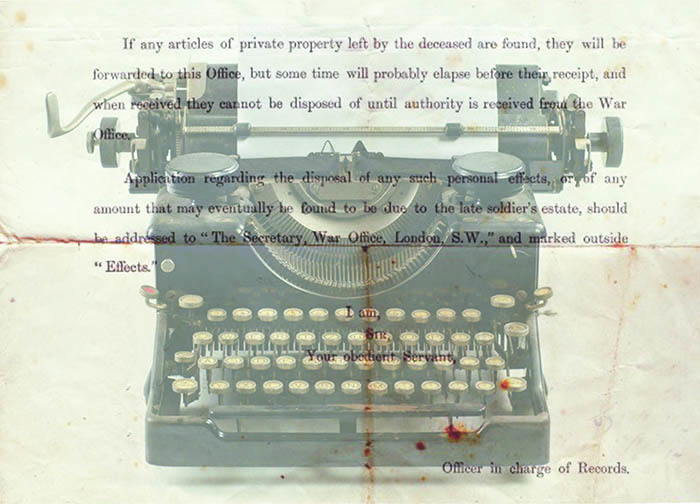
The flyer for masters student James Oberhelm’s banned artwork “Effects” [The Enthronement]
“Prevent is supposed to safeguard communities against the threat of terrorism, but the strategy is, in effect, counterproductive,” Melody Patry, Index on Censorship’s head of advocacy said. “The government should be encouraging discussions about how to counter radicalisation, but, in this case, it has clearly silenced the artist’s interrogation of extremism through his work.”
Oberhelm’s “Effects” [The Enthronement], which dealt with the geopolitics of the Middle East, was set to feature on the first day of the school’s Interim Show in May. It included two propaganda videos issued by Isis, one of which showed an execution carried out by the extremist group on the border between Syria and Iraq. As the emails state, this is “difficult imagery”.
Oberhelm acquired the films from the public domain and had planned for the work to feature several content warnings before showing the clips. An email from someone at GSA (the authors are redacted) on 10 April states: “I think this needs to be looked at by the Prevent Group.” The email goes on to say that the artwork “needs to be considered by the Head of School and with his line manager.”
Oberhelm says he was informed via email on 11 April that his work “is now going to be reviewed by the ‘Prevent Concerns Group.’” The group is “responsible for the strategic development and implementation of measures to meet the Prevent Duty”. His work was subsequently removed from the show.
Artist Bob and Roberta Smith spoke with Index about Oberhelm’s case: “Artists around the world are generally trying to do things that are permissible in democracies but sometimes not in their societies […] Artists must reserve the right to provoke society but that comes with risk and responsibility.”
What follows is a selection of emails made available by the Glasgow School of Art.
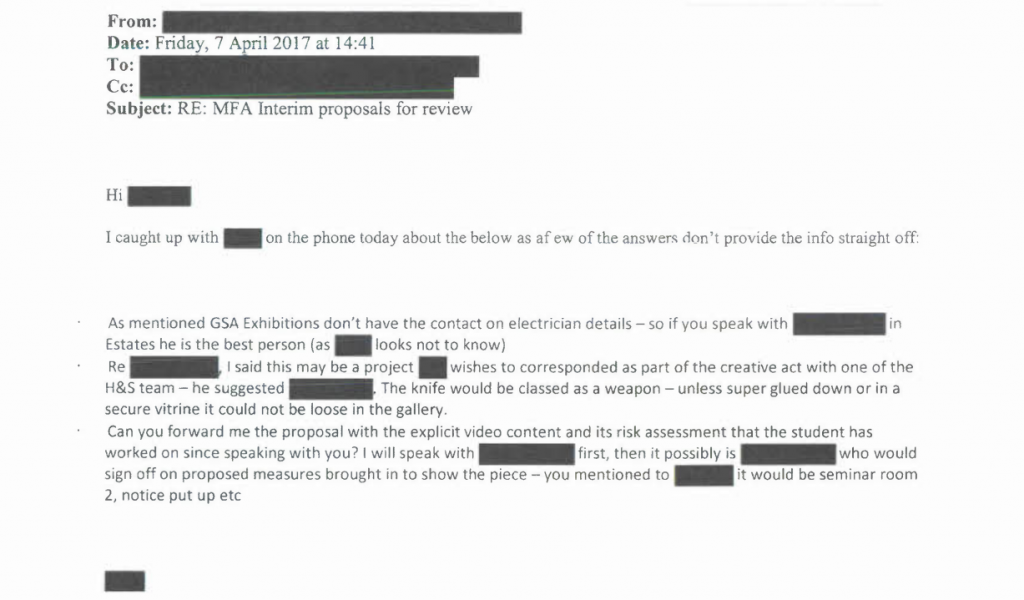
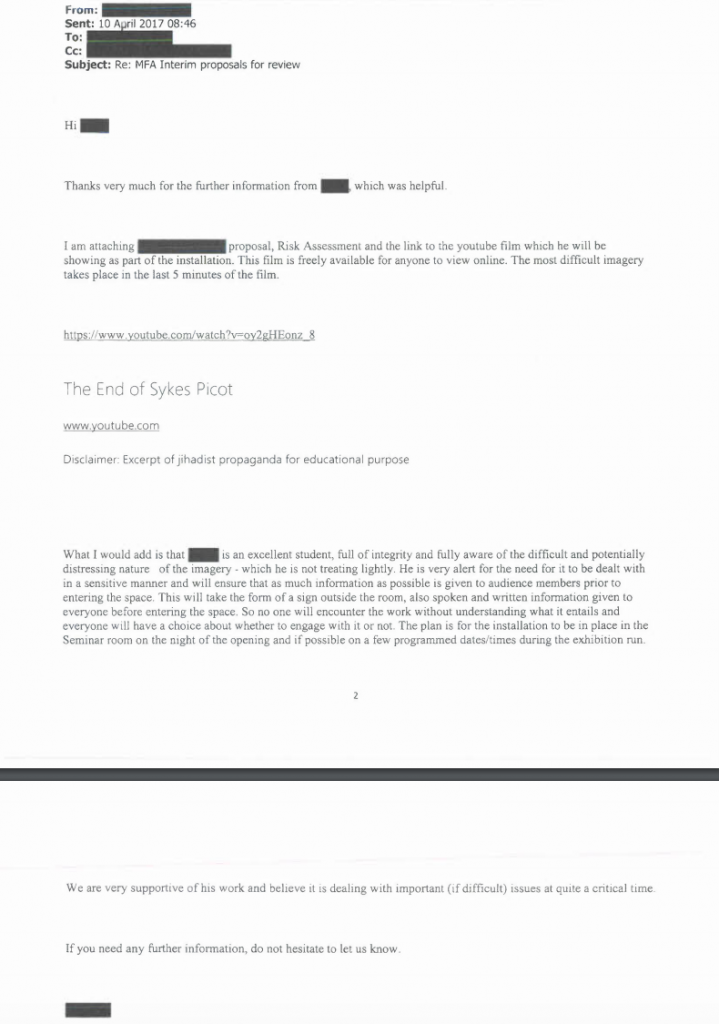
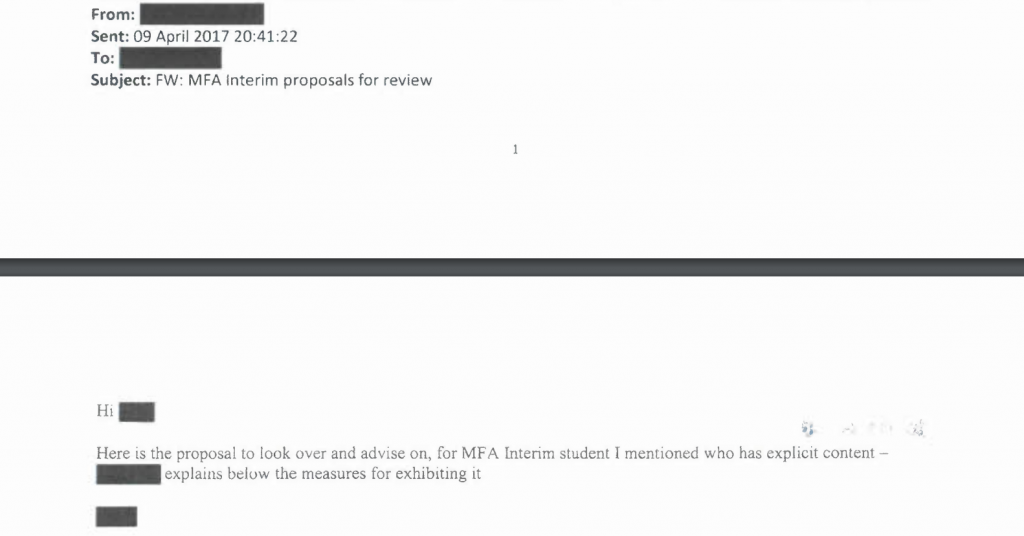
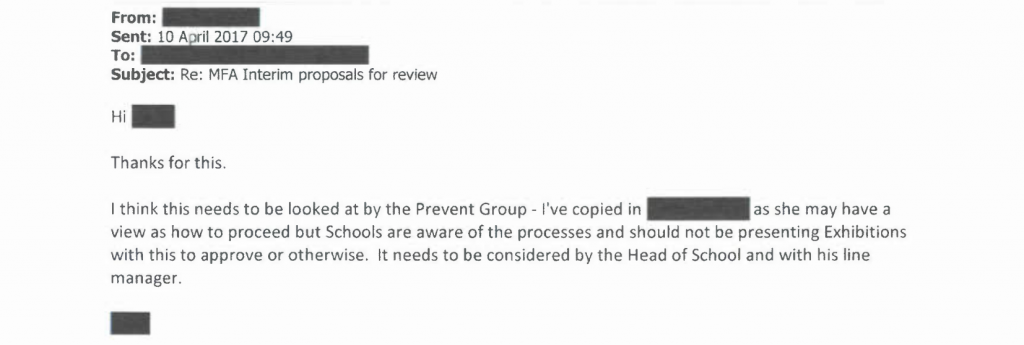

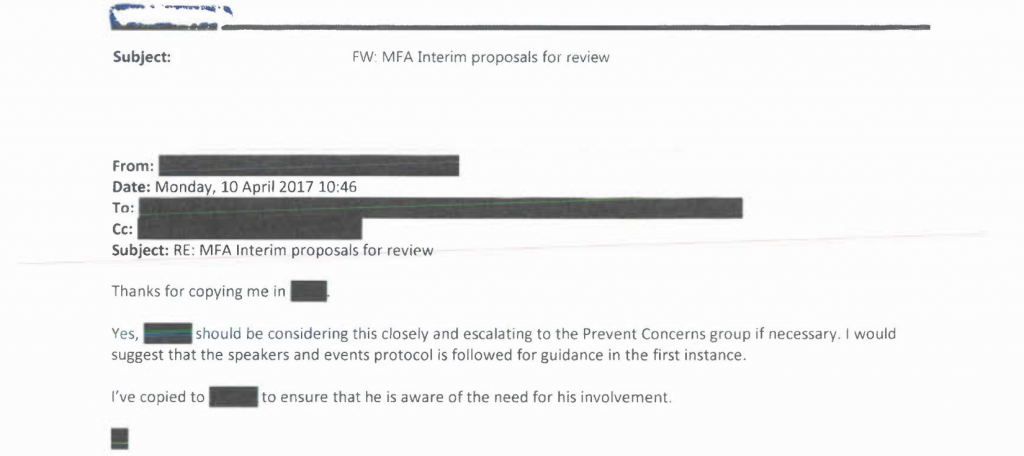 [/vc_column_text][/vc_column][/vc_row][vc_row][vc_column][vc_basic_grid post_type=”post” max_items=”4″ element_width=”6″ grid_id=”vc_gid:1500726862453-8472a316-b3bf-2″ taxonomies=”10100, 8883″][/vc_column][/vc_row]
[/vc_column_text][/vc_column][/vc_row][vc_row][vc_column][vc_basic_grid post_type=”post” max_items=”4″ element_width=”6″ grid_id=”vc_gid:1500726862453-8472a316-b3bf-2″ taxonomies=”10100, 8883″][/vc_column][/vc_row]
21 Jul 2017 | About Index, Event Reports, News and features
[vc_row][vc_column][vc_column_text]
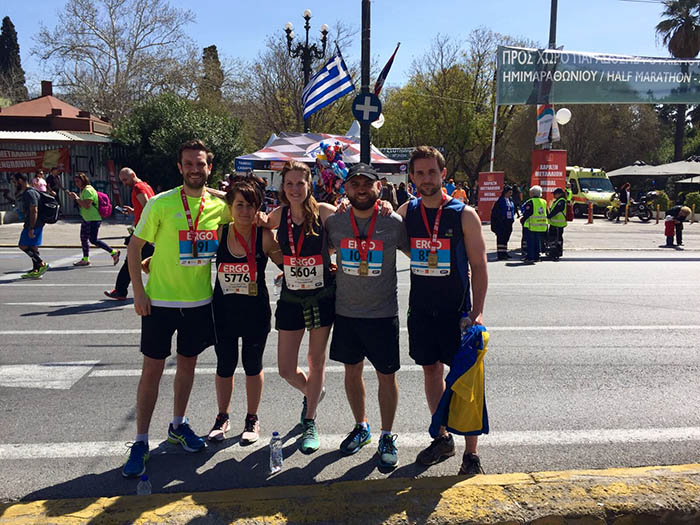
Runners in Athens: James Fox, Miriam Betz Heinemann, Vicky Baker, Dave Depares and David Heinemann
Former Index on Censorship magazine deputy editor Vicky Baker has raised £646 for Index in a race in Athens, Greece, that included running by the world-famous Acropolis.
Baker took part in the 10k run because of her interest in Index’s fellowship programme and raised three times as much as her original goal.
“Running in Athens made the race kind of different. I need sights to keep motivated. We did it around the Acropolis, but not up to the Acropolis. It was really steep, but you could see it, and there’s a bit more going on that keeps you motivated”
“It was quite hilly, but I think I was kind of aware of that, so I used to run up to Epping Forest from where I live, which is quite a hill, so that was my training programme”
She is also concerned about the lack of awareness that media freedom often receives from the public: “People tend to take free speech for granted until it’s something that you’ve lost. There are more free speech issues in our lives than we realise. There are daily stories that do have an impact on free speech that matter very much and aren’t always labelled as ‘free speech.’”
She wanted to support Index because “it’s an organisation that you can very much become involved in. It’s not a big organisation where the money you raise just goes off into the coffers alongside thousands of other donations.”
[/vc_column_text][vc_separator][vc_row_inner equal_height=”yes”][vc_column_inner width=”1/2″][vc_custom_heading text=”Support the Index Fellowship” font_container=”tag:p|font_size:20|text_align:left” use_theme_fonts=”yes” link=”url:https%3A%2F%2Fwww.indexoncensorship.org%2Fsupport-the-freedom-of-expression-awards%2F|||”][vc_column_text]
By donating to the Freedom of Expression Awards you help us support individuals and groups at the forefront of tackling censorship.
Find out more
[/vc_column_text][/vc_column_inner][vc_column_inner width=”1/2″][vc_single_image image=”89551″ img_size=”full” onclick=”custom_link” link=”https://www.indexoncensorship.org/support-the-freedom-of-expression-awards/”][/vc_column_inner][/vc_row_inner][vc_separator][vc_column_text]Baker, a journalist, added: “I have a long-standing relationship with Index because of what they do… I don’t think you ever fully leave. You certainly don’t go ‘oh well I’ve got a new job, I’m not interested in free speech anymore’.”
Baker ran with friends Dave Depares, James Fox and Index’s head of fellowship David Heinemann. They coordinated a Facebook and email campaign to raise funds for Index while Miriam Betz Heinemann ran for the refugee organisation START. The funds raised will be used to support Index’s fellowship programme.
“The fellowship was one of the things that left a big impression on me, having worked at Index. I’ve been really interested in following the stories of winners and nominees and what they do next. It’s a brilliant programme,” Baker said.
“It’s very personal because Index is such a small organisation. It enables them to form those relationships, rather than getting the people to fit into programmes that already exist, the programme kind of works around them and responds very much to what they need, and I think that’s what makes it very special,” she added.
The original fundraising goal was £200, and, at first, Baker worried that they had set the bar too high. After speaking with Index, she increased her goal: “We upped it and then people carried on sort of oblivious to what our total was, they were still supporting us.”
Baker raised three times her original fundraising goal through the support of friends, family and co-workers. “Some of my colleagues [from BBC] very kindly sponsored me too, and I think that was the aspect that appealed to them was the work that Index does protecting journalists… although we’re based in the London newsroom most of the time, obviously we’re dealing with people out in the field in much more dangerous situations,” Baker said.[/vc_column_text][/vc_column][/vc_row][vc_row][vc_column][vc_basic_grid post_type=”post” max_items=”4″ element_width=”6″ grid_id=”vc_gid:1501762788354-aaf003fc-23de-5″ taxonomies=”7902″][/vc_column][/vc_row]
20 Jul 2017 | Campaigns -- Featured, media freedom featured, Statements
[vc_row][vc_column][vc_column_text]His Excellency Petro Poroshenko
President of Ukraine
11 Bankova Street
Kiev 01220
Ukraine
CC: Yuriy Stets, Minister of Information Policy
Dear President Poroshenko,
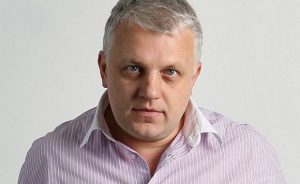
Pavel Sheremet (Photo: Ukrainska Pravda)
We are writing as active partners of the Council of Europe’s Platform to protect journalism and safety of journalists to urge you to ensure that Ukrainian investigating authorities carry out a thorough, independent, and effective investigation into the murder a year ago in Kiev of prominent Belarusian-born journalist Pavel Sheremet.
Sheremet’s killing in a car bombing in Ukraine’s capital city on July 20, 2016, cast a chill over the country’s press corps, and the ongoing impunity for those behind the crime has continued to affect journalists’ ability to cover sensitive subjects.
The current investigation by Ukrainian authorities, including the General Prosecutor’s Office (GPO), National Police, and Security Service of Ukraine (SBU), has produced no results a year after the killing, as confirmed by Committee to Protect Journalists’ recent report, Justice Denied: Ukraine comes up empty in probe of Pavel Sheremet’s murder, which CPJ launched in Kiev last week. Moreover, as CPJ confirmed during its advocacy mission that week–including in a July 11, 2017, meeting with you—authorities currently have no suspects and no leading motive for the murder.
Independent, enterprising journalists in Ukraine work under hostile conditions filled with threats, harassment, and cyberbullying in retaliation for their critical coverage of government policies and the conflict between pro-Russia separatists and Ukrainian security forces in the country’s east. A number of journalists have said they work in fear, both because of the impunity in Sheremet’s killing and authorities’ failure to recognise the importance of a critical, independent press in a democratic society.
The report on Sheremet’s murder brought into relief a number of flaws in the official investigation that need to be addressed without delay. Crucial video evidence that showcased potential suspects or key witnesses of the crime surfaced only after Ukrainian journalists—not investigators—published it. No one has publicly identified two persons seen on security camera footage apparently planting the bomb under Sheremet’s vehicle, although investigators are in possession of a clear photograph of one of the individuals.
The report also found that police and security service officials have each alleged that the other destroyed video evidence; potential witnesses and Pavel Sheremet’s colleagues say investigators have not closely questioned them; and the national police chief first tasked with leading the murder investigation resigned, citing obstruction by her superiors.
Pavel Sheremet and his former Ukrainska Pravda colleagues were under surveillance in the months before his death, but it is unclear by whom, or why. We are very concerned for their safety, especially given that it remains unclear whether the fact of the surveillance is currently being investigated.
The confirmed presence of a former SBU agent, Igor Ustimenko, near Sheremet’s apartment the very night assassins planted the bomb under his car—and the ongoing lack of clarity about the reasons and circumstances of his presence—further raise doubts about the genuineness and thoroughness of the official investigation.
The authorities were unable to provide clear answers to pressing concerns, including to such basic procedural questions as who is in charge of the investigation or why the photo of the person seen on camera footage apparently planting the bomb has not been publicly disclosed. We hope that these issues can be addressed immediately.
Press freedom concerns, including the lack of progress in Sheremet’s murder investigation, were also raised during meetings between the partners of the Council of Europe’s Platform to protect journalism and safety of journalists, and Ukrainian investigating authorities on April 4-5, 2017.
We encourage you, Mr. President, to ensure that the investigation into Sheremet’s killing examines the possibility that Ukrainian officials—former or current—may have been involved. In order to do that, we ask you to consider independent oversight of this case, which is a litmus test not only for Ukraine’s commitment to press freedom but also for its adherence to the rule of law.
We are pleased to learn that during your July 11 meeting with CPJ, you made a commitment to invite an international criminal investigator to support the Ukrainian investigation into Sheremet’s murder. We hope that discussions on this initiative will take place between Ukraine and its international partners without delay, and we encourage you to immediately contact Ukraine’s partners, including the Delegation of the European Union in Kiev, in relation to that.
Lastly, we strongly urge you to take all measures to protect the space for critical and independent journalism, including by condemning the practice of dividing journalists into patriotic and unpatriotic; and by ensuring that reporters can work freely, without fear of reprisal, and with the full protection of the state. Publicly addressing Pavel Sheremet’s colleagues at Ukrainska Pravda on the anniversary of his murder, and making a commitment to defending their safety, would be an exemplary first step toward achieving that goal.
Thank you in advance for your consideration of these urgent matters. We await your response.
Sincerely,
Article 19
Association of European Journalists (AEJ)
Committee to Protect Journalists
European Federation of Journalists (EFJ)
Index on Censorship
International Federation of Journalists (IFJ)
International Press Institute (IPI)
International News Safety Institute (INSI)
Reporters Sans Frontieres (RSF)[/vc_column_text][/vc_column][/vc_row][vc_row][vc_column][vc_separator color=”black”][vc_row_inner][vc_column_inner width=”1/2″][vc_custom_heading text=”Ukraine” font_container=”tag:p|font_size:30|text_align:left” use_theme_fonts=”yes” link=”url:https%3A%2F%2Fmappingmediafreedom.org%2F|||”][vc_column_text]Index on Censorship monitors press freedom in Ukraine and 41 other European area countries.
As of 20/07/2017, there were 284 verified reports of violations connected to Ukraine in the Mapping Media Freedom database.[/vc_column_text][/vc_column_inner][vc_column_inner width=”1/2″][vc_single_image image=”94485″ img_size=”full” onclick=”custom_link” link=”https://mappingmediafreedom.org/#/”][/vc_column_inner][/vc_row_inner][/vc_column][/vc_row]
20 Jul 2017 | Campaigns, Campaigns -- Featured, Media Freedom, media freedom featured, Statements
[vc_row][vc_column][vc_column_text]Dear Mr. Désir
Index on Censorship welcomes your appointment as the Representative on Freedom of the Media by the OSCE member states. We would like to extend our congratulations to you.
Like you, we agree wholeheartedly that the role of RFoM is important. In fact it is more important today than when the office was founded 1997. Since then, the media has faced pressures from a changing financial environment and — in some nations — government interference.
Through its project Mapping Media Freedom, Index on Censorship monitors press freedom violations in 42 OSCE member states. In just the last three years, there have been 3,302 verified incidents. Sadly, the number of reports we investigate is increasing. Journalists are coming under pressure from the left and the right of the political spectrum, from governments and non-state actors, from organised crime and private citizens. These multidimensional threats demand a consistent and robust response that crosses international boundaries.
We ask that, on assuming your responsibilities, you urgently consider the following as your priorities:
- Focusing attention on how the independence of the public media in OSCE member states such as Poland and Hungary is being undermined
- Calling attention to a continent-wide drift toward tighter regulation of the media — whether online or off — in OSCE nations such as France, the UK and Germany
- Raising awareness of widespread interference with the professional duties of journalists through legal obstacles and demands for accreditation, most acutely in OSCE members Belarus, Russia and Azerbaijan
- Building on the record of the RFOM office by being a vocal and visible advocate for journalists
- Continuing a determined and consistent approach to cases of impunity
- Resisting ill-guided attempts to use legislation to further curtail the marketplace of ideas in the member states
- Call out use of terror legislation to silence media by member states
- Mount a sustained campaign against criminal defamation laws in member states
Index on Censorship stands ready to partner with you to protect the media’s right to report and the public’s right to information.[/vc_column_text][/vc_column][/vc_row][vc_row][vc_column][vc_column_text]
Mapping Media Freedom
Click on the bubbles to view reports or double-click to zoom in on specific regions. The full site can be accessed at https://mappingmediafreedom.org/[/vc_column_text][/vc_column][/vc_row]






 [/vc_column_text][/vc_column][/vc_row][vc_row][vc_column][vc_basic_grid post_type=”post” max_items=”4″ element_width=”6″ grid_id=”vc_gid:1500726862453-8472a316-b3bf-2″ taxonomies=”10100, 8883″][/vc_column][/vc_row]
[/vc_column_text][/vc_column][/vc_row][vc_row][vc_column][vc_basic_grid post_type=”post” max_items=”4″ element_width=”6″ grid_id=”vc_gid:1500726862453-8472a316-b3bf-2″ taxonomies=”10100, 8883″][/vc_column][/vc_row]

